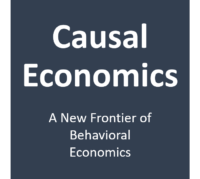What’s the Biggest Difference Between Behavioral Economics and Causal Economics in Marketing?
Behavioral Economics provides a set of powerful and specific types of irrationality that marketers should consider each time they consider customer/prospect engagement. Other articles here lay out many examples. We highly recommend that a BE audit (BEMA) be conducted around each and every communication, to ensure that all relevant insights of BE are leveraged. We
